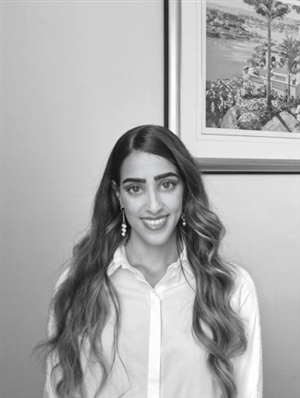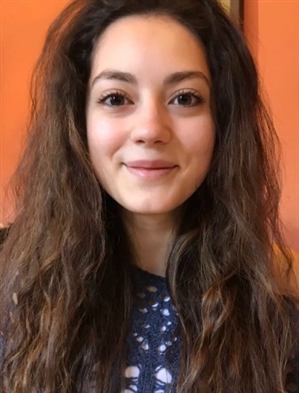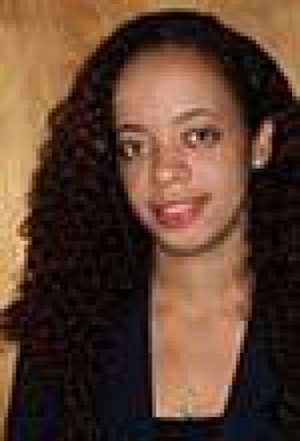William James Award
2018 winner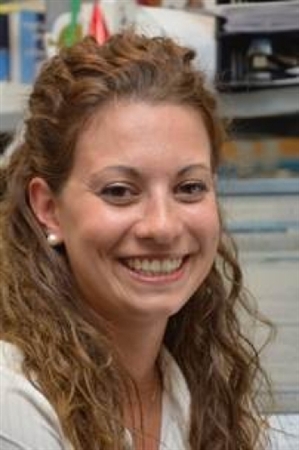 Rossana Castaldo, University of Warwick Rossana Castaldo, University of WarwickPresentation: Wearable technology and ECG for fall prevention, detection and prediction Rossana received her PhD in biomedical engineering at University of Warwick, UK, in 2018. Her PhD was focused on the translation of advanced methodologies and techniques from laboratories into real-life settings for prediction of adverse healthcare events. Rossana also received the M.Sc. degree in biomedical engineering at University of Warwick in 2014. She is currently Research Associate at University of Warwick, where she has been an associate of the Applied Biomedical Signal Processing and Intelligent eHealth Lab since 2013. Her main areas of expertise are biomedical signal processing, machine learning and data analytics. She has authored or co-authored about 18 journal, book and conference papers. Rossana is member of the Italian Scientific society on Medical and Biomedical Engineering and member of the International Women Committee of the International Federation of Medical and Biomedical Engineering (IFMBE). |
2017 winner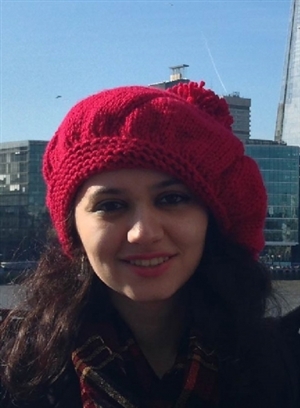 Ghazal Ghazaei, Newcastle University Ghazal Ghazaei, Newcastle UniversityPresentation: Deep learning – Based artificial vision for grasp classification on myoelectric hands I am a PhD student in the school of Electrical and Electronic Engineering (biomedical signal processing lab) at Newcastle university. I received my BSc degree from Iran University of Science and Technology, Tehran in Electrical and Electronic Engineering in 2014. I am interested in applying machine learning and computer vision to biomedical problems. View Ghazal's presentation online. |
2016 winner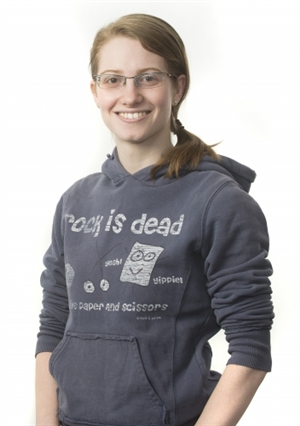 Samantha Simons, University of Surrey Samantha Simons, University of SurreyPresentation: Classification of Alzheimer’s disease from quadratic Sample entropy of electroencephalogram Samantha graduated from the University of Surrey with a first MEng (Hons) degree in Medical Engineering and was further awarded prizes for outstanding achievement. Her masters dissertation, 'Quadratic Sample Entropy Analysis of the Electroencephalogram in Alzheimer's Disease' was shortlisted for the 2012 IMechE Corin Group Prize for Best Sports, Healthcare and Wellbeing Technology Project and was awarded the IET Dennis Hill Award. Her PhD, with supervisor Dr Daniel Abasolo, is entitled 'Analysis of brain signals with advanced signal processing techniques to help in the diagnosis of Alzheimer's disease' and is due to be completed in the coming year, supported by scholarships from the University of Surrey and an IET Leslie H Paddle Scholarship. Samantha was also the technical chair and a committee member for the 7th UK and RI Postgraduate Conference in Biomedical Engineering and Medical Physics. View Samantha's presentation online. |
2015 winner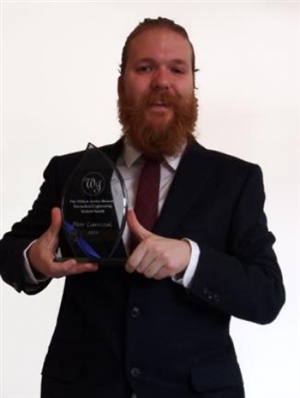 Piotr Laszczak, University of Southampton Piotr Laszczak, University of SouthamptonPresentation: Development of tri-axial pressure and shear (TRIPS) sensors for lower limb prosthetics Mr Piotr Laszczak is a finishing PhD student in Biomedical Engineering. Piotr graduated from the University of Southampton with an MEng (Hons) in 2012. Subsequently, he undertook his PhD at that university and was involved in development of flexible pressure and shear sensors for use at the amputee's lower limb stump/socket interface. This work has been recognised by the IET and in 2015 Piotr was awarded William James Award for his paper 'Development and validation of a 3D-printed interfacial stress sensor for prosthetic applications'. Piotr's interests include electronic and mechanical systems with application in biomedical field. View Piotr's presentation online. |
2013 winner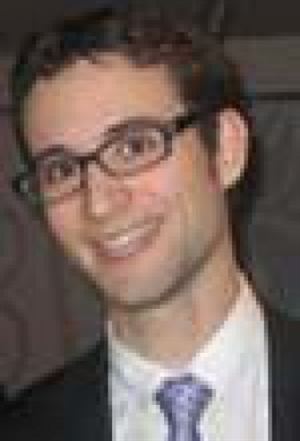 Joachim Behar, Institute of Biomedical Engineering (IBME) Joachim Behar, Institute of Biomedical Engineering (IBME)Presentation: Non-Invasive FECG Extraction from a Set of Abdominal Sensors Joachim is a DPhil student in the Intelligent Patient Monitoring Group at the Institute of Biomedical Engineering (IBME), supervised by Dr Gari Clifford and Dr Julien Oster. His research focuses on the development of signal processing methods for non-invasive foetal electrocardiography as an alternative to the foetal clinical monitoring methods used to date. View Joachim's presentation online. |
2012 winner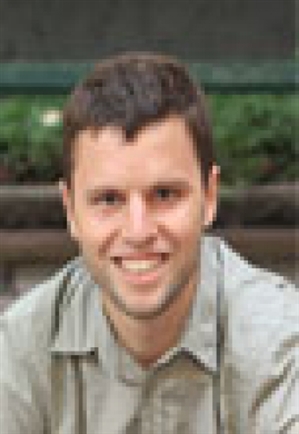 Alistair E W Johnson, Oxford University Alistair E W Johnson, Oxford UniversityPresentation: A new severity of illness scale using a subset of APACHE data elements shows comparable predictive accuracy Alistair received his Bachelor of Engineering at McMaster University, Canada, and is currently reading for his Doctor of Philosophy in the Centre for Doctoral Training in Healthcare Innovation at Oxford University. As a member of the Intelligent Patient Monitoring group, Alistair has devoted his research efforts toward medical prediction systems with the aim of synthesizing complex patient physiology into clinically interpretable severity metrics for use in improving patient care. View Alistair's presentation online. |
2011 winner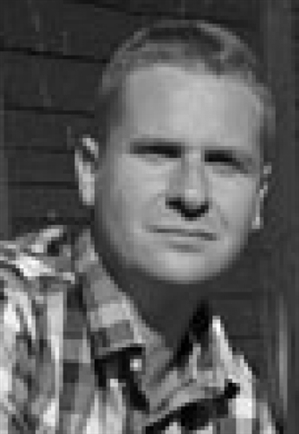 John James Wilson, University of Essex John James Wilson, University of EssexPresentation: The steady state visual evoked potential as a paradigm for viable brain-computer interfaces |
| 2010 winner Mr Samuel Hugueny, Department of Engineering Science, University of Oxford Presentation: Probabilistic Patient Monitoring Using Extreme Value Theory |
| 2009 winner Ms Sarah Tomlinson, University of Sheffield Presentation: Understanding the friction between human fingers and contacting surfaces in grip |
| 2008 winner Ms Susannah Flemming, Lionel Tarassenko's Biomedical Signal Processing and e-health research group, University of Oxford Presentation: Measurement and fusion of non-invasive vital signs for routine triage of acute paediatric illness |
| 2007 winner Mr Oliver Gibson, Department of Engineering Science, University of Oxford Presentation: Decision support algorithms for the management of diabetes |
| 2006 winner Ms Disha Gupta, ISVR, University of Southampton Presentation: Advances in Medical, Signal and Information Processing |
| 2005 winner Mr Bright Osei Twumasi, ABERG Research Group, Bournemouth University |
| 2004 winner Mr Alessandro Beda, ISVR, University of Southampton |
Dennis Hill Award
2018 winner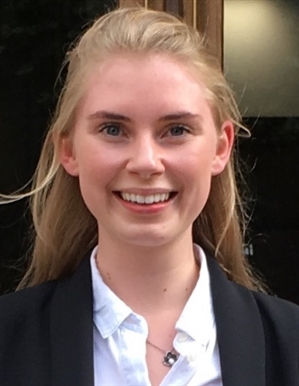 Jennifer Bishop, Oxford University Jennifer Bishop, Oxford UniversityPresentation: Managing the health of the hospital-data-driven approaches for intelligent discharge prediction Originally from Stockport, Jennifer studied her GCSE’s at a local comprehensive school and her A-levels at Loreto Sixth Form College in Manchester. She then went on to study Engineering Science for four years at St Peter’s College, Oxford University, from which she recently graduated with a first class MEng degree. Throughout this degree she was awarded the Diamond Jubilee Scholarship by the IET, for which she is extremely grateful. In the third and fourth years of Jennifer’s degree she chose to focus her studies on biomedical and information engineering modules. Her interest in these fields developed as a result of her spending the summer of the second year as an intern at a company called Oxehealth, which specializes in measuring vital signs information using video data. This resulted in Jennifer choosing to do a masters project with Professor David Clifton and his research group in the field of healthcare informatics. View Jennifer's presentation online. |
2017 winner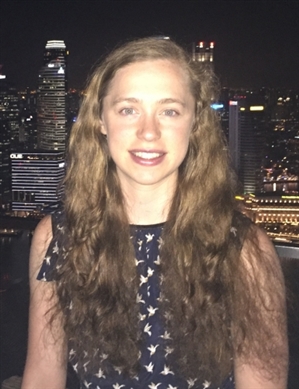 Jessica Barnes, Newcastle University Jessica Barnes, Newcastle UniversityPresentation: Abstract Muscle Synergy for the control of Hand Prostheses Jessica Barnes, 22 years old from Southampton. The love of mathematics, science and technology I developed at an early age made the decision to pursue a career as an engineer a natural progression. I read an Electronic and Electrical Engineering MEng degree at Newcastle University, and have recently graduated with a First Class with honors. My ambition is to become a Chartered Engineer and I also look to inspire the next generation of young engineers. View Jessica's presentation online. |
2016 winner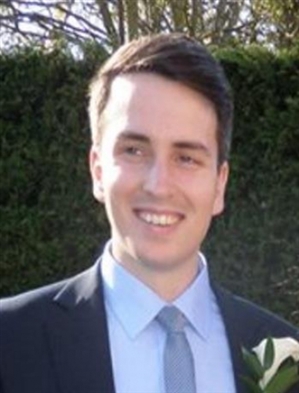 William Hawkes, University of Surrey William Hawkes, University of SurreyPresentation: Wavelet analysis of the electroencephalogram in Alzheimer's disease: Automatic classification of signals with diagnostic purposes. Currently, I am working towards obtaining my PhD at King’s College London. By utilising nanopatterning and biophysical molecular techniques, I hope to better understand the role of tissue mechanics during development and pathology of the heart. The paper I am presenting was carried out as part of my Masters degree in Biomedical Engineering at the University of Surrey. Utilising the wavelet transformation, I sought to characterise the electroencephalographic data of patients with Alzheimer’s Disease from healthy controls. Prior to studying at Surrey, I completed my undergraduate degree in Sport and Exercise Science at London South Bank University. View William's presentation online. |
2015 winner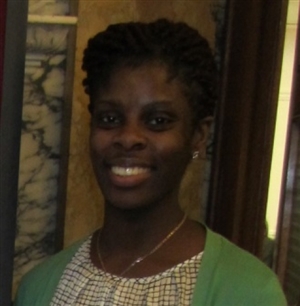 Tricia Adjei, University of Surrey Tricia Adjei, University of SurreyPresentation: Characterisation of Intracranial Pressure Signals in Patients with Hydrocephalus with Advanced Signal Processing Techniques. Whilst studying for an MEng degree in medical engineering at the University of Surrey, I was fortunate enough to be tutored by Dr. Daniel Abásolo, who has a vast amount of experience in signal processing. It was under Dr. Abásolo’s supervision that I first embarked on an Engineering and Physical Sciences Research Council funded studentship in biomedical signal processing; ever since, I have been fascinated by the application of signal processing techniques to physiological signals. Unsurprisingly, by the time I graduated from university in July 2014, I had already set my heart upon building a career within the realm of biomedical signal processing, and since August 2014, I have been employed as a researcher at Oxehealth Ltd., a camera based biomedical software company in Oxford. Working at Oxehealth Ltd. has been an invaluable experience, introducing me to the real- world application of biomedical signal processing techniques, and I am still thoroughly captivated by the concept of uncovering new useful physiological information from signals which are measured on a daily basis in clinical settings the world over. View Tricia's presentation online. |
2012 winner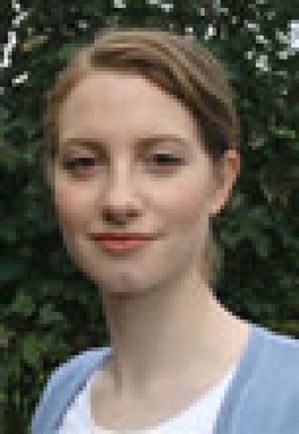 Samantha Simons MEng(Hons), University of Surrey Samantha Simons MEng(Hons), University of SurreyPresentation: Multiscale Entropy Analysis of the Electroencephalogram in Alzheimer's Disease Samantha graduated this summer from the University of Surrey with a first in Medical Engineering and was further awarded prizes for outstanding achievement. Her PhD is also at the University of Surrey and is on the Analysis of brain signals, with advanced signal processing techniques, to help in the diagnosis of Alzheimer's disease, furthering work started in her Masters Project. View Samantha's presentation online. |
2011 winner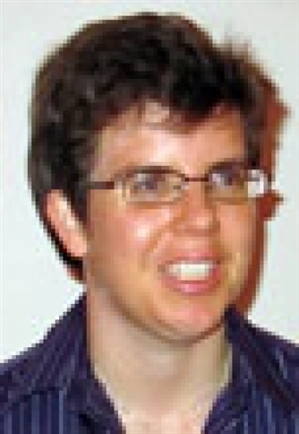 Alison Aird, University of Strathclyde Alison Aird, University of StrathclydePresentation: A non-invasive system for real time detection and treatment of sleep apnea |
| 2010 winner Mr Marco Schiavottiello, Centre for Health Informatics, City University London Presentation: ICHEST: Development of a web application for chest radiography |
| 2009 winner Mr Fadi El-Turk, Centre for Health Informatics, City University London Presentation: Using a mobile phone to remotely monitor high dependency patients |
| 2008 winner Ms Juliette Cunningham, City University London Presentation: AK - nearest neighbour prediction algorithm for unusual haemoglobin variants |
| 2007 winner Ms Fiona Dennis, Yeovil District Hospital Presentation: PACS Equipment deployment |
J.A Lodge Award
| 2019 winner Tingting Zhu, St. Hilda's College, Oxford Presentation: Patient-Specific Physiological Monitoring and Prediction Using Structured Gaussian Processes Tingting graduated with the DPhil degree in information and biomedical engineering at Oxford University in 2016. This followed her MSc in Biomedical Engineering at University College London and BSc in Electrical Engineering from the University of Malta. Tingting's interests lie in machine learning for healthcare applications and she has developed probabilistic techniques for reasoning about time-series medical data. Tingting’s doctoral research focused on developing algorithms for online, unsupervised learning, combining crowd-sourced medical data. After DPhil, Tingting was awarded a Stipendiary Junior Research Fellowship at St. Hilda's College, Oxford. In 2018, Tingting was appointed as its first Associate Member of Faculty by the Department of Engineering Science; in 2019, following the award of her RAEng Research Fellowship, she was appointed to full Member of Faculty. Tingting’s research involves the development of machine learning for understanding complex patient data, with an emphasis on Bayesian inference, deep learning, and applications involving the developing world. |
2018 winner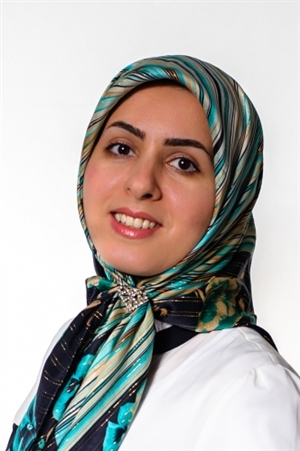 Shima Ghasemi-Roudsari, CREAVO Medical Technologies Shima Ghasemi-Roudsari, CREAVO Medical TechnologiesPresentation: A portable prototype magnetometer to differentiate ischemic and non-ischemic heart disease in patients with chest pain Currently, at CREAVO Medical Technologies, Shima is the lead research and project scientist for medical diagnostic technologies and is a member of IET. She has experience of both supporting medical device development through the product life cycle, while also working on research which forms the long term strategic vision of the company. She oversees the algorithm and sensor system requirements including verification and validation for a team of five engineers. In 2017, Shima was part of CREAVO Medical Technologies team which received the IET innovation awards for Healthcare and Emerging Technology Design categories. At CREAVO she had opportunities to support, set and conduct clinical studies to assist in the testing and evaluation of the CREAVO’s medical device in hospital Emergency Departments. This includes writing medical study protocols, training clinical staff, recruiting patients, collecting patient scans in hospitals and carrying out the post-trial analysis. Shima has a BSc degree in Applied Physics (Iran), MSc in Quantum Technologies and obtained a PhD in Medical Physics (UK, Leeds University—Experimental Quantum Information Group). Her PhD work and clinical research in Medical Physics- Magnetocardiography formed part of the technology transfer from Leeds University to CREAVO. View Shima's presentation online. |
2017 winner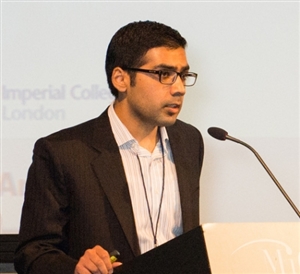 Syed Anas Imtiaz, Newcastle University Syed Anas Imtiaz, Newcastle UniversityPresentation: Wearable Devices for Sleep Monitoring and Diagnosis Syed Anas Imtiaz is a Postdoctoral Research Associate working in the Wearable Technologies Lab at the Department of Electrical and Electronic Engineering, Imperial College London, United Kingdom. His research focuses on the design of ultra-low power wearable systems for the diagnosis, monitoring, and treatment of sleep disorders. More specifically, he is interested in using biomedical signal processing techniques to extract sleep parameters and develop low complexity algorithms for detection of sleep abnormalities. He also works on the design of low power integrated circuits and embedded systems for real-time implementation of these algorithms. View Syed's presentation online. |
2016 - no winner awarded |
2015 winner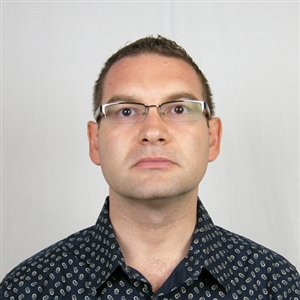 Cristian A.Linte, Rochester Institute of Technology Cristian A.Linte, Rochester Institute of TechnologyPresentation: Techniques for Image Guidance, Visualization and Navigation in Computer-Assisted Therapy. Cristian A. Linte holds an academic appointment as Assistant Professor in Biomedical Engineering and Center for Imaging Science at Rochester Institute of Technology in Rochester NY. Dr. Linte’s research interests have focused on the discovery and development of innovative imaging, navigation and visualization techniques and instrumentation to improve the understanding, diagnosis and treatment of human diseases through minimally or non-invasive approaches, conducting research across several themes, including medical image processing, cardiac imaging, multi-modality image registration and fusion, modeling and simulation 3D and stereoscopic visualization, augmented, virtual and mixed reality, instrument tracking, and computer-assisted interventions. His research has been disseminated in more than 60 journal articles and peer-reviewed conference proceedings and has been recognized with several distinctions at international congresses. In 2011, Cristian was recognized with the IEEE MGA GOLD Achievement Award for his leadership and contribution to the IEEE Engineering in Medicine and Biology Society. View Cristian's presentation online. |
2013 winner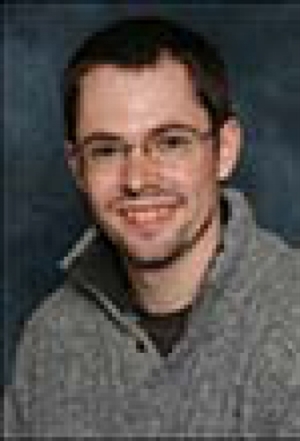 Dr Alex Casson, University of Manchester Dr Alex Casson, University of ManchesterPresentation: Low-power signal processing for novel neurotechnology Dr Alex Casson is a lecturer in the Sensing, Imaging and Signal Processing group in the school of Electrical and Electronic Engineering at the University of Manchester. His research focuses on creating very low power integrated circuits, and investigating how the innovations in these circuits can be used to create new devices that can help keep our increasingly ageing population healthy for longer. Typical applications of his circuits are in brainwave monitoring, in brain-computer interfaces, and in transcranial stimulation. He has extensive expertise in wearable sensors and is starting to develop systems that incorporate energy harvesting features. View Alex's presentation online. |
2012 winner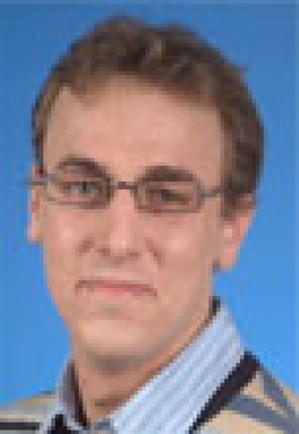 Dr Julien Oster, University of Oxford Dr Julien Oster, University of OxfordPresentation: Model-based electrocardiogram analysis: applications to a noisy situation with recordings during magnetic resonance imaging Dr Oster is currently a Royal Society Newton International Fellow working in the Institute of Biomedical Engineering at the University of Oxford. His current research focuses on the development of statistical signal processing techniques for the removal of blood flow artifacts in cardiac electrophysiological data recorded during magnetic resonance imaging. View Julien's presentation online. |
2011 winner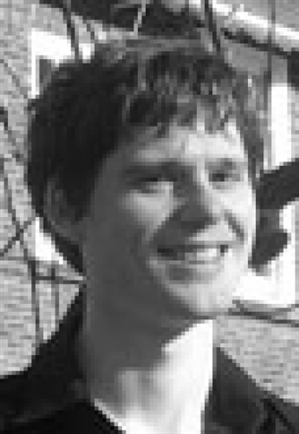 David Clifton, University of Oxford David Clifton, University of OxfordPresentation: Intelligent patient monitoring using novelty detection with extreme value statistics |
| 2009 winner Dr Dingchang Zheng, Newcastle University Presentation: Development of clinical measurement technique and novel medical devices for cardiac arterial assessment |
| 2007 winner Dr Michael Burcher, University of Oxford Presentation: Advanced beamforming for 3D ultrasound imaging |
| 2006 winner Mr Kenneth Kearney, Sensor Technology & Devices Ltd Presentation: Developing a pulse wave velocity (PWV) measuring system which can be used as a screener for common diseases including diabetes and hypertension |
| 2005 winner Dr Ian Craddock, University of Bristol; Mr Nicholas Hughes, University of Oxford Presentation: Methods and apparatus for measuring internal structure |
| 2003 winner Mr Chris Gibbs, Bath Institute of Medical Engineering Presentation: Assistive technology for people with dementia |
| 2000 winner Mr DM Williams, Arrowe Park Hospital |
| 1999 winner Mr PJ Edwards, Guy’s Hospital Presentation: Microscope-assisted guided interventions (MAGI) |
| 1998 winner Dr M Fry, University College London Presentation: NIR imaging instrument |
